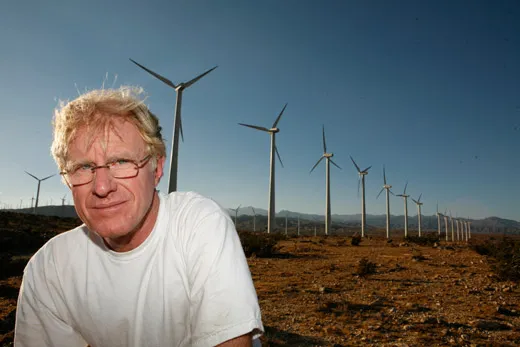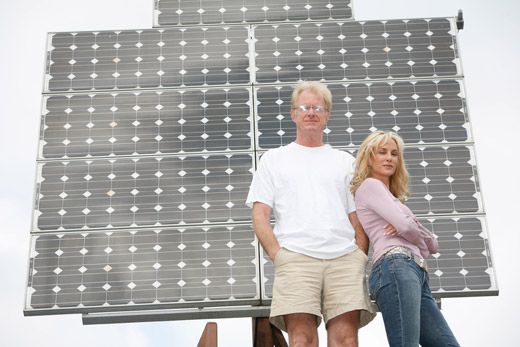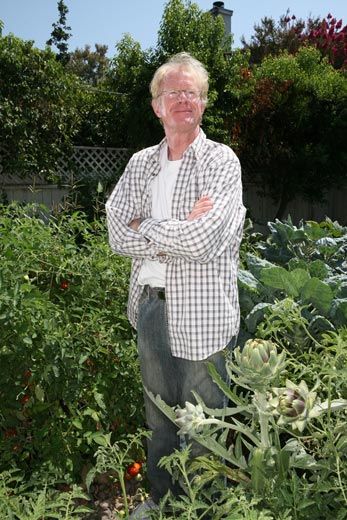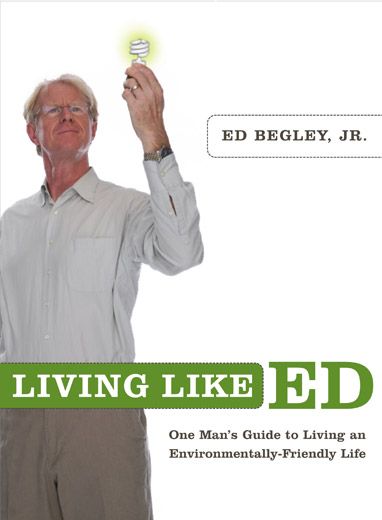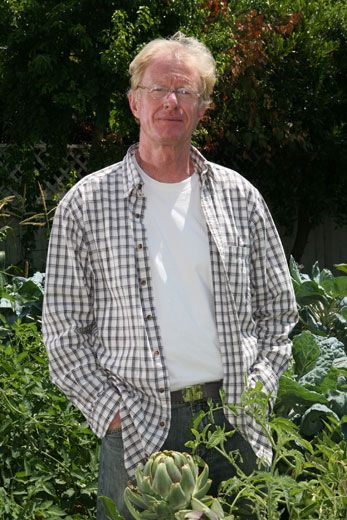Q&A - Ed Begley, Jr.
Actor and environmental activist Ed Begley, Jr. talks about living green
/https://tf-cmsv2-smithsonianmag-media.s3.amazonaws.com/filer/gl-begley-631.jpg)
The first Earth Day, 1970, inspired then-struggling actor Ed Begley, Jr. to dedicate his life to lessening his impact on Earth. Even as he earned six Emmy nominations for his portrayal of Dr. Victor Ehrlich on St. Elsewhere and appeared in such movies as A Mighty Wind and Batman Forever, he became known for his environmentalism as much as his acting. People laughed when he rode his bicycle to the Oscars. But as gas prices approach $4 a gallon, they're not laughing any more.
Begley and his wife Rachelle Carson (pictured above) matched wits in their domestic reality show Living with Ed, which ran for two seasons on HGTV.
"He has a genuine concern for the planet, then on top of that he wants to see [how little] energy we can consume," says Carson, an actress named after Rachel Carson, the late biologist whose landmark book Silent Spring (1962) warned about the indiscriminate use of pesticides. "He re-insulated the house and got our energy down even more. He blames me because I use a blow drier, God forbid."
With his book, Living Like Ed (Clarkson Potter, $18, printed on recycled paper) Begley, 58, has been sharing a secret he learned long ago: you can save money by going green.
How did you become an environmentalist?
After 20 years of living in smoggy LA in the ‘50s and ‘60s, on the first Earth Day, I decided to do something. I bought an electric car, I started recycling. I started composting. I started buying biodegradable soaps and detergents. I changed my diet. Not only did it feel good, but much to my surprise I was saving money. I did it to save the environment but when I realized I was saving money, I went, wow, I've got to stick with this.
What keeps you going?
Since I started this in 1970, we have four times the amount of cars in LA and yet we have half the smog. That's a big deal. We had another success with ozone depletion. In the ‘70s, we banned CFCs (chlorofluorocarbons) from spray cans. Then we got really serious about it after the Montreal accord in 1987. Now the ozone hole is smaller. The Hudson River was so polluted for years you couldn't fish there. Now it's a productive fishery because of the Hudson River Keeper and the Clean Water Act. I believe we can do it on every front. We just have to get cracking.
How do you minimize your impact on the environment?
I urge people to pick the low hanging fruit. Do the stuff that's cheapest and easiest first. I couldn't afford solar panels in 1970. I was a struggling actor. I started recycling and composting. I bought an electric car for $950. But I found quickly it was cheaper to charge it than it was to buy gasoline. There was no tune up, oil change, or smog check. I made my house very energy efficient with good insulation. Compact florescent bulbs, an energy saving thermostat, good insulation, double pane windows. I did that first. That was much cheaper than solar panels. So you do that and then you move up the ladder. I get by on solar power and I buy renewable energy out in the marketplace.
My favorite form of transportation is walking. I live in a neighborhood where you can walk to restaurants, banks, and shops. Number two is my bicycle. Number three is public transportation. My electric car [a Toyota Rav-4 with an 80-mile range] is a distant fourth. My wife's hybrid is fifth. Then sixth, if I have to be in LA on Monday and DC on Tuesday, I get in a plane like anybody else but I avoid it at all costs.
Are you off the grid?
No, it was an elusive goal I've never quite achieved. When I was single, I was down to $100 of power a year. Now there are three of us [wife Rachelle and daughter Hayden, 8] so there's $300 a year worth of green power I buy from the LA Department of Water & Power Green Power Program. I owned a wind turbine in the California desert as an investment, part of a wind farm. So I've put out many homes' worth of power since 1985. I buy a Terra Pass [carbon offsets] for my air travel or for my wife's tailpipe emissions on her Toyota Prius and for my home energy use.
I do as much as possible with solar on my roof, buying alternative energy as an investment and carbon offsets. I live in a little house, which is part of the good news. But there's just not enough roof space to produce enough electricity. One day, if I can build a second story and get my panels up in the clear I'll be off the grid.
People know they should use compact fluorescent light bulbs and insulate their homes, but how do they overcome their inertia?
Just start. Do something. People are overwhelmed looking up at the Mount Everest of environmental challenges that we face. But you put one foot in front of the other and you recognize that not everyone is Sir Edmund Hillary. You get to the base camp and get acclimated and see how high you can climb. That's what I recommend, that people take the first step.
What is the first step?
Getting out of your car would be the best single thing that anybody could do. It could mean walking in your neighborhood, taking public transportation., or riding a bike if weather and fitness permit.
Are enough people making these changes?
I think enough people are doing it for today. Now we need more people to do it tomorrow.
People in Hollywood once called you a fanatic. How did that feel?
I didn't mind so much. The dog barks but the caravan moves on. Let people say what they want. I knew what I was doing made sense. Not only did I feel I was doing something for the environment but I was saving money. I'm not a wealthy person because I was never a star. I was a working actor and a supporting actor. But I have something that's as good as having a lot of money. My bills are very low because of all these investments I've made in my future.
Did that hurt your career?
According to my manager and my agent in the ‘90s, people were hesitant to hire me because they thought I'd make trouble on the set. I never did make trouble on the set but people were fearful of that. People on the set would come up and say, "Please, Ed, don't be angry. We're going to take care of it. Just bear with us until lunch."
"What are you talking about?" I'd ask.
"We'll have the recycling bins."
"Okay, get the recycling bins."
You were 40 years ahead of Leo DiCaprio and even Al Gore. How does it feel to be a green celebrity?
It feels good that people are doing the right things to clean up the air in cities like LA and Houston and Bakersfield to lessen our dependence on Mideast oil and to put money in all our pockets. Whatever reason people are doing it, I'm just happy it's happened.
Is your TV show (Living With Ed) going for a third season?
We're talking to other cable venues. It won't be on HGTV. I'm doing lots of speaking engagements. I'm lobbying the halls of Congress. I'm doing a Woody Allen movie. I've got an HBO movie called Recount out in May and a Seth Rogen movie called Pineapple Express out in August. I'm not sure I have time for a reality show.
What's the most unusual response you've gotten to your book or show?
The most unusual response to the book is "$18?!" and to the TV show it's, "That woman's too good for you."
One of the show's themes is that your wife, Rachelle, finds your environmentalism annoying. Does that reflect reality?
It does. She thinks what I do is kind of wacky. At the end of the day she cares about the environment, she's just not quite as zealous as I am. There is friction. It's not put on. But we mostly laugh about it. That's the most important thing. You've got to laugh.
We hear such dire reports about global warming and ice shelves collapsing and predictions of doom. Can we avert disaster?
Yes, if we do something now. People said we couldn't do something about the smog in LA and we did. People said it would be many decades before we turned around the ozone depletion. They said we'd never be able to clean up the Hudson River. Lake Erie was dead. The Cuyahoga River was just going to catch fire. People said the [Berlin] wall was never going to come down, apartheid was never going to end. I don't buy it. I think we can turn this one around too. It's a big one, and I think we can do it.
